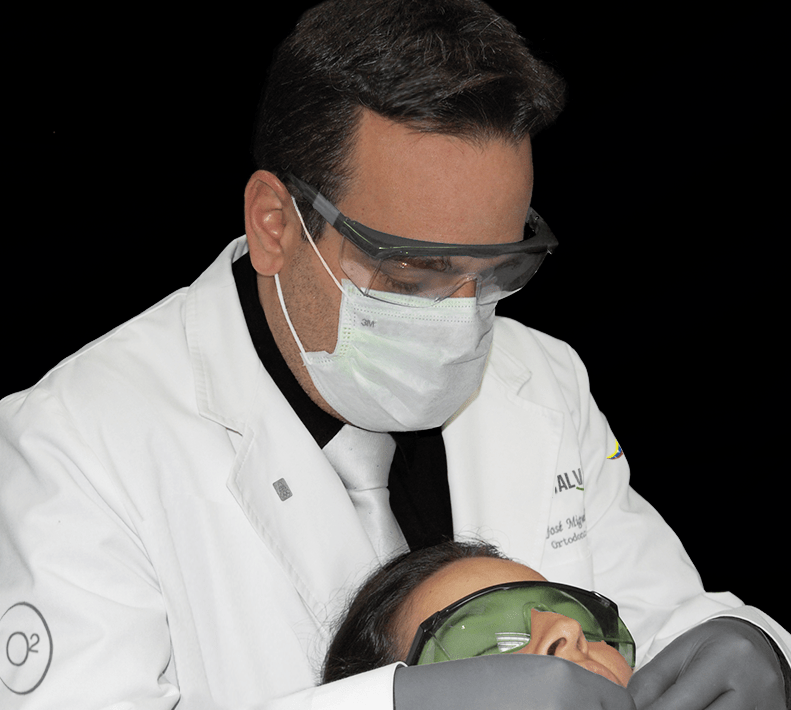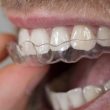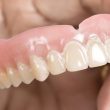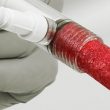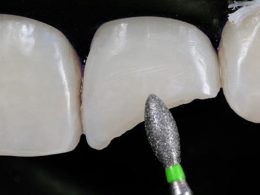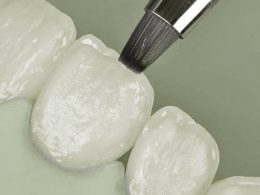Table of Contents
Have you ever felt pain or discomfort in your teeth immediately after eating ice cream or a spoonful of hot soup? If so, you already know and realize what tooth sensitivity is!
Although this type of symptomatology in front of food can also be characteristic of dental caries, in most cases it is due to a state of dental hypersensitivity, produced by exposed dentin or permeable dentin.
Dentin is the tissue immediately below the enamel. It is a tubular structure, 70% composed of hydroxyapatite, while 20% is organic matter and the remaining 10%, water. It is also the layer that gives the tooth its color, since the enamel is translucent, and normally its hue is yellowish. Its main functions are to support the enamel and transmit any external stimulus from the crown or root of the tooth, to the nerve or pulp tissue.
Dental sensitivity or dentin hypersensitivity is exactly that: pain or discomfort constant and permanent in the teeth in response to certain specific stimuli; mainly cold, heat and substances with a high sugar content.
It is usually a chronic problem and can affect one tooth, several teeth, or all the teeth in the mouth. It can have several different causes, but most cases of sensitive teeth are easily treated with a good diagnosis of the case.
Symptoms of Dentin Hypersensitivity
People with sensitive teeth may experience pain or discomfort in response to certain triggers. They may feel the pain in just one area or in the entire mouth. The most common triggers include:
- Hot foods and drinks.
- Cold foods and drinks.
- Cold air.
- Sweet foods and drinks.
- Acidic foods and drinks.
- Cold water, especially during the daily oral hygiene routine.
- Brushing and flossing.
- Mouth rinses with alcohol.
Symptoms can come and go over time, intermittently and for no obvious or apparent reason. They can also range from mild to severe.
Causes of Tooth Sensitivity
Although the true cause of tooth hypersensitivity is increased dentin permeability, some people are more susceptible to it because they have thinner than normal enamel. Enamel is the outermost or superficial layer of the tooth, which covers and protects it. In many cases, tooth enamel can be worn away by:
- Brushing the teeth too hard.
- Use a toothbrush with very stiff bristles.
- Clenching or grinding the teeth at night
- Eating or drinking excessively acidic foods and drinks.
Gum retraction due to bad brushing or periodontal disease can also leave root surfaces exposed and unprotected, which generates hypersensitivity.
Cavities, chipped or broken teeth, defective fillings, and very old crowns can also expose the dentin of the tooth and cause discomfort. If that is the case, you may only feel sensitivity in a single tooth or particular region, rather than your entire mouth.
It is normal that after certain dental treatments such as fillings, root canals, crowns or whitenings; a certain degree of dental sensitivity may be experienced, also limited to the intervened teeth. However, the discomfort should disappear after a few days.
Sometimes systemic conditions are responsible for the problem. Gastroesophageal reflux disease (GERD), for example, can cause the acids that come out of the stomach and esophagus to wear down the teeth over time. Conditions that cause frequent vomiting, such as gastroparesis and bulimia, can also destroy enamel.
How Is this Problem Diagnosed?
If you experience severe tooth sensitivity, make an appointment with your Dentist right away. He will be able to evaluate the health of your teeth and detect any potential problem such as cavities, defective fillings or receding gums; which is probably directly responsible for your symptoms.
Your Dentist can also do this during your routine dental check-up and cleaning. It is possible that when manipulating the teeth with metal instruments, a discomfort reaction is triggered, before temperatures or acids are the trigger factors.
In these cases, it would be pertinent to perform a complete periapical radiographic study to rule out permeable fillings, proximal caries and/or any other infectious pathology. Next, apply fluoride and review the brushing technique.
Treating Dental Hypersensitivity
If your tooth sensitivity is mild and you have never had it before, you can try over-the-counter dental products.
Choosing a toothpaste that is made specifically for sensitive teeth can be a good start. These pastes will not contain any irritating ingredients and will contribute desensitizing agents that help prevent the problem.
With regard to mouthwashes, always choose an alcohol-free one, as it will be less stimulating for sensitive teeth.
Use softer bristle toothbrushes and be more subtle with the technique. To brush well, it is not necessary to apply excessive force or make long horizontal movements.
If home treatments do not work within 10-15 days, you should make an appointment with your Dentist right away. Of course, the first thing to do is to rule out the existence of any dental pathology or any old restoration in poor condition, which could be causing problems. If the results of the clinical and radiographic examination are negative, would be started a desensitizing treatment against exposed and permeable dentin, using the indicated product or products according to the clinical criteria of your Dentist.
Desensitizing Agents
In theory, and in the absence of obvious dental pathology, in-office desensitizing therapy should provide almost immediate relief from the symptoms of tooth sensitivity. There are many topical desensitizing agents, which are classified based on whether or not they undergo a setting reaction (hardening).
Among those that set we find bonding materials and glass-ceramic biomaterials. Among those that do not set we have fluorides, oxalates and varnishes. Let us see each of them below:
Fluorides
Traditionally, fluorides have been used to prevent tooth decay, since they can help in the remineralization of enamel and dentin. However, several clinical trials have shown that applying a fluoride solution can significantly decrease tooth sensitivity.
Fluorides decrease dentin permeability by precipitation of calcium fluoride crystals within the dentin tubules. These crystals are resistant to removal by the action of saliva, brushing or the intake of foods and drinks.
Oxalates
Oxalates can reduce dentin permeability and occlude dentin tubules. Oxalate reacts with calcium ions in dentin to form calcium oxalate crystals within dentin tubules and on the surface of dentin.
Its effectiveness can be improved by acid etching the tooth surface, thus enhancing the penetration of calcium oxalate crystals into the dentin tubules. Thirty percent potassium oxalate has been shown to be very effective, reducing dentin permeability by up to 98%.
Varnishes
Varnishes have been used for many years to treat this problem. Copal varnish can be applied to cover the exposed tooth surface, but its effect is only short-term. In addition, varnishes can act as a vehicle for fluorine. Fluoride varnishes can be acidified to increase the penetration of their ions.
“For the Treatment of Tooth Sensitivity, It Is Necessary to Place Some Material On the Tooth to Seal Its Surface”.
DENTAL TIP
Bonding Materials
Adhesive composite dental systems can provide a much more stable and long-lasting desensitizing effect. Adhesive resins can seal dentin tubules effectively, forming a hybrid layer.
Conventional bonding agents remove the smear layer, etch the dentin surface, and occlude the dentin tubules. Recently, some specially manufactured bonding agents for the treatment of tooth sensitivity have been introduced on the market.
The procedure is very similar to that of making a dental reconstruction with composite, since in essence it is about bonding a material on the dental surface, but in this case not to reconstruct a tooth, but to seal it.
Glass-Ceramic Biomaterials
Bioglass® was a product developed to stimulate the formation of new bone. It is used in implantology to cover implants and promote the osseointegration process, and also to fill bone defects during periodontal surgery. That is, it is an osteoinductive material.
It has recently been reported that a Bioglass® formulation can also promote infiltration and remineralization of the dentin tubules. Its basic component is silica, which acts as a nucleation site for the precipitation of calcium and phosphate salts. Some analyzes have shown that the application of Bioglass® forms a layer of apatite that occludes the dentin tubules.
Are You Facing an Unaffordable Quote for Dental Treatment that Keeps You from Smiling?
Are you thinking of getting Cosmetic Dentistry or Dental Implants in Venezuela? The rising cost of dental care in many countries is driving the Dental Tourism movement as people seek more affordable dental work abroad. If you are facing an unaffordable quote for dental treatment in your home country, DENTAL VIP could be a much cheaper alternative with savings of 60% or more.
Every year thousands of international patients visit Caracas to take advantage of high quality healthcare at affordable prices. Dental procedures in Venezuela are on par with treatment provided in any “developed” country of the world. The cost, however, is significantly less.
At DENTAL VIP we offer a wide range of world class dental treatments such as Dental Implants, Crowns and Bridges, Smile Design, Dental Veneers, Oral Surgery and Zygomatic Implants; among others.
Furthermore, we are available to assist you with transfer and accommodation options while visiting Caracas for dental care. Contact us today and leave smiling from Venezuela!
